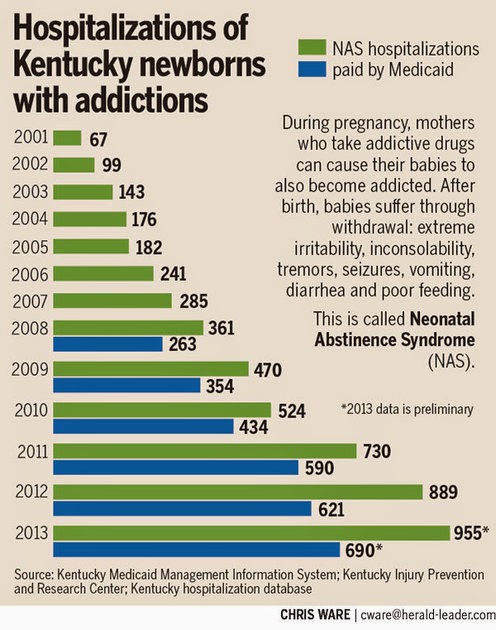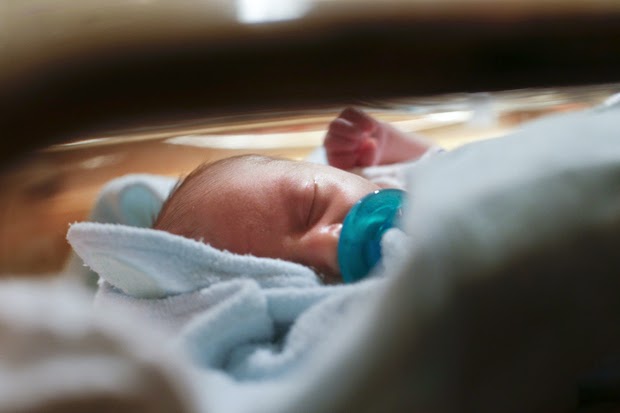Health News
- Ky. Gets $3 Million Grant To Expand Substance Abuse Treatment For Pregnant Women After Big Jump In Drug-dependent Newborns
Kentucky will receive up to $3 million in federal grants over three years to provide expanded substance abuse treatment for pregnant and postpartum women in the Bluegrass and Cumberland regions of the state, according to a news release from the governor's...
- Anthem Gives Hospital Group Grant To Improve Perinatal Care, Including Discouraging Early, Medically Unnecessary Deliveries
The foundation of Anthem Blue Cross Blue Shield has awarded nearly $259,000 to an arm of the Kentucky Hospital Association to improve perinatal care and outcomes for mothers and their babies by discouraging early, medically unnecessary deliveries...
- Number Of Kentucky Babies Born Addicted Keeps Rising Quickly As Heroin Replaces Harder-to-get Prescription Painkillers
Despite the crackdown on prescription painkillers, more Kentucky babies are being born addicted, "fueled by a recent spike in heroin use," much of it by people who have found prescription painkillers harder to get, Laura Ungar reports for The Courier-Journal....
- Fda Changes Painkiller Labels To Warn Expectant Mothers, After 2,500% Growth In Number Of Ky. Babies Born Addicted To Drugs
The U.S. Food and Drug Administration (FDA) announced Tuesday drug-safety labeling changes and new post-market study requirements for all extended-release and long-acting opioids, and Kentucky political leaders applauded these measures to curb prescription...
- A Safe Haven For Mothers
The Safe Haven law in Maryland, passed in 2002, allows mothers to leave newborn babies at a hospital, fire or police station without being prosecuted and with no questions asked. That means Sinai and Northwest hospitals are safe havens. The purpose of...
Health News
Kentucky doctors treat an increasing number of babies suffering from drug addiction given to them by their mothers
Neonatal abstinence syndrome, or NAS, is becoming such a widespread problem that many medical professionals are calling it an epidemic and a public-health crisis. In 2001, 67 Kentucky babies were hospitalized for drug withdrawal, and in 2013, 955 were, according to the Cabinet for Health and Family Services, Justin Madden writes for The Lexington Herald-Leader.
Henrietta Bada, a neonatologist at the University of Kentucky Children's Hospital, said babies born with NAS are eager to eat, "but then you give them their formula or their feedings, but they just cannot." She said they can't "coordinate their suck-swallow reflexes . . . If they are not treated, then they end up with weight loss, dehydration," and are sicker than if they had only been going through withdrawal.
Bada said she can treat the babies with medication, but she wants to make sure they go to a safe home: "Babies have to go home to a mother that is capable of taking care of him or her." There isn't enough care for mothers dealing with drug addictions, she said, "and the lack of care continues after the baby is born." She also noted that at least 80 percent of the medical bills are paid through Medicaid, "which can cost as much as $60,000."
 The Kentucky Perinatal Association and the state's Department for Public Health are working together to make standardized treatments for mothers and babies, The Associated Press reported earlier this month. Officials also continue to look for ways to solve the state's drug problem.
The Kentucky Perinatal Association and the state's Department for Public Health are working together to make standardized treatments for mothers and babies, The Associated Press reported earlier this month. Officials also continue to look for ways to solve the state's drug problem.
Eric Reynolds, a neonatologist at Kosair Children's Hospital in Louisville, pointed out that NAS isn't always a result of a mother abusing drugs. "We need better treatment options for the pregnant mothers who have a legitimate medical reason to be on these types of medications," he said.
Reynolds and Bada said endeavors to fight NAS begin with education, and Reynolds added that the long term effects of NAS are not yet known because it's early in the epidemic, Madden writes.
 |
Baby Sheena, who has neonatal abstinence syndrome, in treatment at the University of Kentucky Children's Hospital. (Lexington Herald-Leader photo by Mark Cornelison) |
Bada said she can treat the babies with medication, but she wants to make sure they go to a safe home: "Babies have to go home to a mother that is capable of taking care of him or her." There isn't enough care for mothers dealing with drug addictions, she said, "and the lack of care continues after the baby is born." She also noted that at least 80 percent of the medical bills are paid through Medicaid, "which can cost as much as $60,000."

Eric Reynolds, a neonatologist at Kosair Children's Hospital in Louisville, pointed out that NAS isn't always a result of a mother abusing drugs. "We need better treatment options for the pregnant mothers who have a legitimate medical reason to be on these types of medications," he said.
Reynolds and Bada said endeavors to fight NAS begin with education, and Reynolds added that the long term effects of NAS are not yet known because it's early in the epidemic, Madden writes.
- Ky. Gets $3 Million Grant To Expand Substance Abuse Treatment For Pregnant Women After Big Jump In Drug-dependent Newborns
Kentucky will receive up to $3 million in federal grants over three years to provide expanded substance abuse treatment for pregnant and postpartum women in the Bluegrass and Cumberland regions of the state, according to a news release from the governor's...
- Anthem Gives Hospital Group Grant To Improve Perinatal Care, Including Discouraging Early, Medically Unnecessary Deliveries
The foundation of Anthem Blue Cross Blue Shield has awarded nearly $259,000 to an arm of the Kentucky Hospital Association to improve perinatal care and outcomes for mothers and their babies by discouraging early, medically unnecessary deliveries...
- Number Of Kentucky Babies Born Addicted Keeps Rising Quickly As Heroin Replaces Harder-to-get Prescription Painkillers
Despite the crackdown on prescription painkillers, more Kentucky babies are being born addicted, "fueled by a recent spike in heroin use," much of it by people who have found prescription painkillers harder to get, Laura Ungar reports for The Courier-Journal....
- Fda Changes Painkiller Labels To Warn Expectant Mothers, After 2,500% Growth In Number Of Ky. Babies Born Addicted To Drugs
The U.S. Food and Drug Administration (FDA) announced Tuesday drug-safety labeling changes and new post-market study requirements for all extended-release and long-acting opioids, and Kentucky political leaders applauded these measures to curb prescription...
- A Safe Haven For Mothers
The Safe Haven law in Maryland, passed in 2002, allows mothers to leave newborn babies at a hospital, fire or police station without being prosecuted and with no questions asked. That means Sinai and Northwest hospitals are safe havens. The purpose of...
